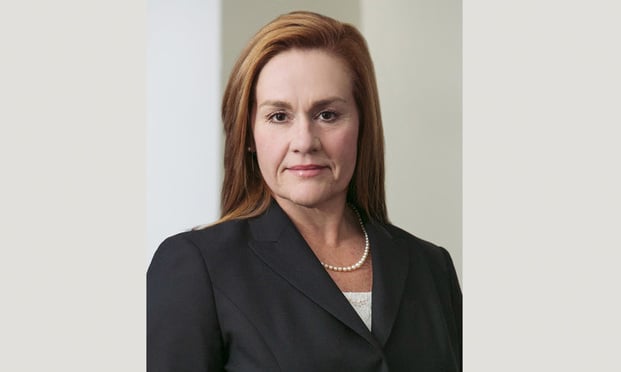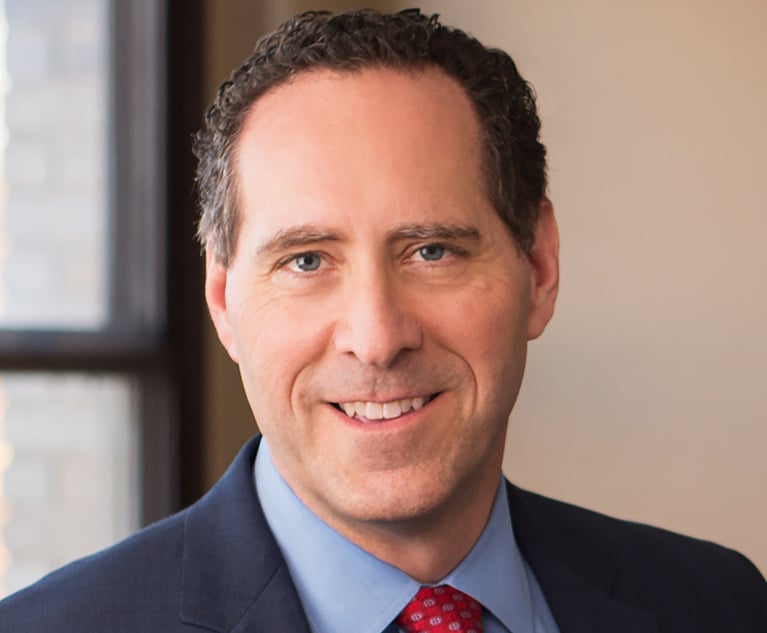Morgan Lewis eData Founder: Legal Should View Data 'The Way Silicon Valley Does'
As part of the Legalweek 2020 Q&A series, Legaltech News speaks with Morgan Lewis partner and 'troublemaker' Tess Blair on a lack of digital transformation, the wide gap between the consumer user experience and the legal user experience, and more.
January 21, 2020 at 12:30 PM
6 minute read
The original version of this story was published on Legal Tech News
 Tess Blair, Morgan, Lewis & Bockius. Courtesy photo.
Tess Blair, Morgan, Lewis & Bockius. Courtesy photo.
There's data analysis, and then there's data analysis. Most law firms today know how to look at a line graph of costs, or to chart revenue from a certain client. But how many firms are actively taking the next step: Seeking out new forms of data to learn something that you didn't know before, to give a leg up on competitors or to work for clients in an unforeseen way? It's something that many would say they'd love to do, but answering the "how" can be difficult—unless you know what roadblocks you're facing.
As part of the run-up to Legalweek 2020, Legaltech News is chatting with a number of speakers from this year's sessions to know. Today's Q&A is with Tess Blair, partner at Morgan, Lewis & Bockius and founder of the firm's e-data practice. Her Legaltech sessions include "GDPR & CCPA Are Fueling High Demand for On-Point RegTech Solutions" at 11:30 a.m. Feb. 4; "Algorithmic Malpractice & Lawfare" at 2 p.m. Feb. 4; and "With Over $1B in Venture Backed Capital, Could We Be on the Verge of Another Tech Bubble?" at 3:30 p.m. Feb. 4.
Legaltech News: What do you think legal tech looks like in 10 years? What will be the biggest opportunities and challenges?
Tess Blair: I see a profession where access to legal technology will be easier and broader, applications simpler and more diverse and use of technology in practice universal. Practice is likely to be far more platform based with far more dominant players in each legal tech market segment. So instead of countless contract review/analytics platforms and e-discovery packages, perhaps we'll have fewer but really good ones that are offered on platforms differentiated by user base. The winning platforms will be simple, secure, nimble, but importantly will be designed to optimize practice by leveraging user data.
This is probably wishful thinking, but I'd like to see the gap close between the consumer user experience and the legal user experience, and my user experience in legal is downright pitiful compared to my experience using even the most basic online consumer platforms. Maybe we don't want a MySpace for legal, but can we get an Amazon or a Spotify-like experience?
What will be the biggest opportunities and challenges?
As is true throughout the economy, data will be the currency of future practice. Access to and the profession's ability to monetize its data is at once the biggest opportunity and the biggest challenge in legal tech.
For a profession that is in essence an information consumption, generation and delivery business, law has not even begun to figure out how to exploit the value in our data, our information, our knowledge. Indeed, a lot of lawyers will tell you they can't even find it half the time. Few have the courage to say it out loud, but KM in legal is regarded by many as an utter failure both in concept and in reality, and until we finally acknowledge that and start to think about our data the way Silicon Valley does, legal will never realize the enormous untapped value we're sitting on.
What is the biggest roadblock to digital transformation?
The historical roadblocks have been significant but they are falling away and new entrants to the profession and the legal tech market are clearing a path to real transformation. The first has historically been lack of investment resources or even incentives to investing in the resources necessary to digitally transform an organization. Law firms are not structured to do R&D or to make long term infrastructure investments, and legal departments still have a heavy lift when seeking transformational technology investment from the business. Of course, we are now seeing a veritable flood of outside investment in legal tech companies, which will hopefully find its way to worthy ideas and companies.
Second, lawyers have a well-earned reputation as Luddites, and even among those who are technophiles, the notion of transformational change in the profession may be intimidating. That is changing as diversity in the profession and greater workforce improves. Legal tech is no longer created by or for a single user base or use case. Diverse perspectives, requirements, and applications are creating opportunities and ideas in legal tech and infusing it with new energy and an optimism that's been missing.
The biggest historical roadblock to transformational change in legal tech was probably complacency. Until the 2008 financial crisis, the profession faced little competition or pressure to change. Now, that competition is everywhere: new law companies, ALSPs, LPOs, and the Big Four. Proposed changes in law firm ownership rules promise to fuel even more. Competition between law firms has always been cordial, but legal technology is (finally) creating real opportunities for competitive separation between firms. And of course, legal tech enables corporates to do plenty of their own legal work that used to go outside.
Have you seen digital transformation become easier or harder to accomplish over the past few years?
I don't think we have seen much of it yet. The conditions are ripe for the long predicted disruption in legal, all of the elements are there—investment dollars, a lagging market with ample problems to solve and opportunities to exploit (and gobs of data), entrepreneurs with great ideas and new tech and a receptive customer base enjoying a very busy, productive business cycle. The tipping point might be the next downturn, but the smart money won't wait.
What do you hope attendees take away from your Legalweek sessions?
I'm doing a number of panels and hope to be a troublemaker. In a good way, of course. Question received wisdom. Think differently about legal tech and about the way we practice. Look, this is a very exciting time to practice and especially to practice at the intersection of law, technology and data. But there is no rulebook for this, so it is up to those of us who practice here to work together to talk about how law ought to be practiced in the future.
This content has been archived. It is available through our partners, LexisNexis® and Bloomberg Law.
To view this content, please continue to their sites.
Not a Lexis Subscriber?
Subscribe Now
Not a Bloomberg Law Subscriber?
Subscribe Now
NOT FOR REPRINT
© 2025 ALM Global, LLC, All Rights Reserved. Request academic re-use from www.copyright.com. All other uses, submit a request to [email protected]. For more information visit Asset & Logo Licensing.
You Might Like
View All
Cozen O'Connor's Bernard Nash Pioneered the Modern State AGs Practice. Now He's Hanging Up His Boots
6 minute read
Cohen Seglias Leader Discusses Growing From Construction Practice into Full-Service Law Firm


Trending Stories
Who Got The Work
J. Brugh Lower of Gibbons has entered an appearance for industrial equipment supplier Devco Corporation in a pending trademark infringement lawsuit. The suit, accusing the defendant of selling knock-off Graco products, was filed Dec. 18 in New Jersey District Court by Rivkin Radler on behalf of Graco Inc. and Graco Minnesota. The case, assigned to U.S. District Judge Zahid N. Quraishi, is 3:24-cv-11294, Graco Inc. et al v. Devco Corporation.
Who Got The Work
Rebecca Maller-Stein and Kent A. Yalowitz of Arnold & Porter Kaye Scholer have entered their appearances for Hanaco Venture Capital and its executives, Lior Prosor and David Frankel, in a pending securities lawsuit. The action, filed on Dec. 24 in New York Southern District Court by Zell, Aron & Co. on behalf of Goldeneye Advisors, accuses the defendants of negligently and fraudulently managing the plaintiff's $1 million investment. The case, assigned to U.S. District Judge Vernon S. Broderick, is 1:24-cv-09918, Goldeneye Advisors, LLC v. Hanaco Venture Capital, Ltd. et al.
Who Got The Work
Attorneys from A&O Shearman has stepped in as defense counsel for Toronto-Dominion Bank and other defendants in a pending securities class action. The suit, filed Dec. 11 in New York Southern District Court by Bleichmar Fonti & Auld, accuses the defendants of concealing the bank's 'pervasive' deficiencies in regards to its compliance with the Bank Secrecy Act and the quality of its anti-money laundering controls. The case, assigned to U.S. District Judge Arun Subramanian, is 1:24-cv-09445, Gonzalez v. The Toronto-Dominion Bank et al.
Who Got The Work
Crown Castle International, a Pennsylvania company providing shared communications infrastructure, has turned to Luke D. Wolf of Gordon Rees Scully Mansukhani to fend off a pending breach-of-contract lawsuit. The court action, filed Nov. 25 in Michigan Eastern District Court by Hooper Hathaway PC on behalf of The Town Residences LLC, accuses Crown Castle of failing to transfer approximately $30,000 in utility payments from T-Mobile in breach of a roof-top lease and assignment agreement. The case, assigned to U.S. District Judge Susan K. Declercq, is 2:24-cv-13131, The Town Residences LLC v. T-Mobile US, Inc. et al.
Who Got The Work
Wilfred P. Coronato and Daniel M. Schwartz of McCarter & English have stepped in as defense counsel to Electrolux Home Products Inc. in a pending product liability lawsuit. The court action, filed Nov. 26 in New York Eastern District Court by Poulos Lopiccolo PC and Nagel Rice LLP on behalf of David Stern, alleges that the defendant's refrigerators’ drawers and shelving repeatedly break and fall apart within months after purchase. The case, assigned to U.S. District Judge Joan M. Azrack, is 2:24-cv-08204, Stern v. Electrolux Home Products, Inc.
Featured Firms
Law Offices of Gary Martin Hays & Associates, P.C.
(470) 294-1674
Law Offices of Mark E. Salomone
(857) 444-6468
Smith & Hassler
(713) 739-1250





